BMP4002 Business Law: Analysis of UK Legal Framework, 2021/22
VerifiedAdded on 2023/06/09
|7
|2634
|189
Exam
AI Summary
This document presents a comprehensive solution to a Business Law exam, focusing on the UK's legal systems. It covers the sources of English law, including legislation, case law, human rights law, and EU law. The exam solution also addresses the differences between criminal and civil law, and the impact of regulations on company conduct, with specific emphasis on employment law, including recruitment, pay, and discrimination as governed by acts such as the Equality Act 2010. The paper highlights the importance of businesses adhering to these regulations to protect employees and customers. Desklib offers a wide range of similar solved assignments and past papers for students.
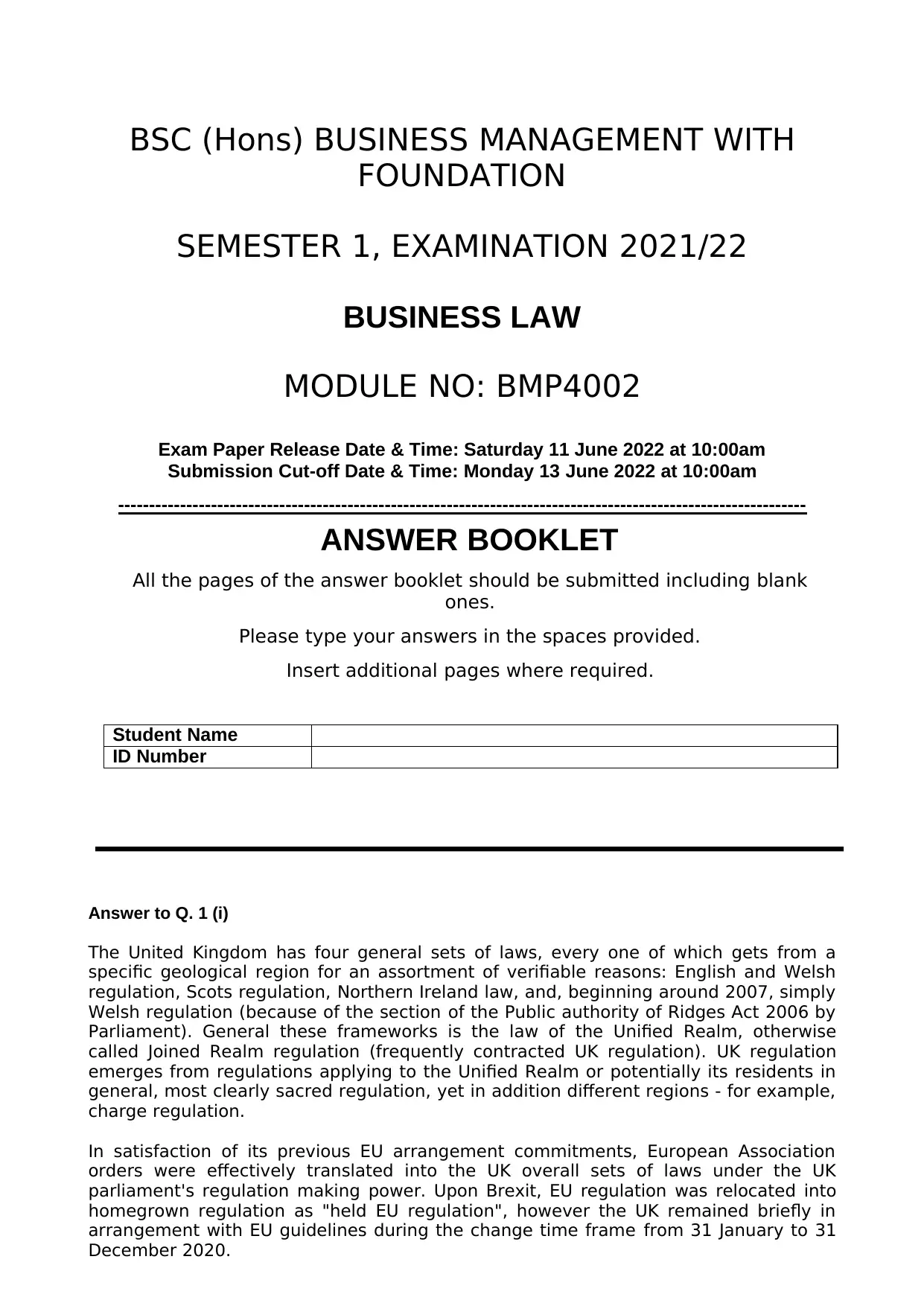
BSC (Hons) BUSINESS MANAGEMENT WITH
FOUNDATION
SEMESTER 1, EXAMINATION 2021/22
BUSINESS LAW
MODULE NO: BMP4002
Exam Paper Release Date & Time: Saturday 11 June 2022 at 10:00am
Submission Cut-off Date & Time: Monday 13 June 2022 at 10:00am
---------------------------------------------------------------------------------------------------------------
ANSWER BOOKLET
All the pages of the answer booklet should be submitted including blank
ones.
Please type your answers in the spaces provided.
Insert additional pages where required.
Student Name
ID Number
Answer to Q. 1 (i)
The United Kingdom has four general sets of laws, every one of which gets from a
specific geological region for an assortment of verifiable reasons: English and Welsh
regulation, Scots regulation, Northern Ireland law, and, beginning around 2007, simply
Welsh regulation (because of the section of the Public authority of Ridges Act 2006 by
Parliament). General these frameworks is the law of the Unified Realm, otherwise
called Joined Realm regulation (frequently contracted UK regulation). UK regulation
emerges from regulations applying to the Unified Realm or potentially its residents in
general, most clearly sacred regulation, yet in addition different regions - for example,
charge regulation.
In satisfaction of its previous EU arrangement commitments, European Association
orders were effectively translated into the UK overall sets of laws under the UK
parliament's regulation making power. Upon Brexit, EU regulation was relocated into
homegrown regulation as "held EU regulation", however the UK remained briefly in
arrangement with EU guidelines during the change time frame from 31 January to 31
December 2020.
FOUNDATION
SEMESTER 1, EXAMINATION 2021/22
BUSINESS LAW
MODULE NO: BMP4002
Exam Paper Release Date & Time: Saturday 11 June 2022 at 10:00am
Submission Cut-off Date & Time: Monday 13 June 2022 at 10:00am
---------------------------------------------------------------------------------------------------------------
ANSWER BOOKLET
All the pages of the answer booklet should be submitted including blank
ones.
Please type your answers in the spaces provided.
Insert additional pages where required.
Student Name
ID Number
Answer to Q. 1 (i)
The United Kingdom has four general sets of laws, every one of which gets from a
specific geological region for an assortment of verifiable reasons: English and Welsh
regulation, Scots regulation, Northern Ireland law, and, beginning around 2007, simply
Welsh regulation (because of the section of the Public authority of Ridges Act 2006 by
Parliament). General these frameworks is the law of the Unified Realm, otherwise
called Joined Realm regulation (frequently contracted UK regulation). UK regulation
emerges from regulations applying to the Unified Realm or potentially its residents in
general, most clearly sacred regulation, yet in addition different regions - for example,
charge regulation.
In satisfaction of its previous EU arrangement commitments, European Association
orders were effectively translated into the UK overall sets of laws under the UK
parliament's regulation making power. Upon Brexit, EU regulation was relocated into
homegrown regulation as "held EU regulation", however the UK remained briefly in
arrangement with EU guidelines during the change time frame from 31 January to 31
December 2020.
Paraphrase This Document
Need a fresh take? Get an instant paraphrase of this document with our AI Paraphraser
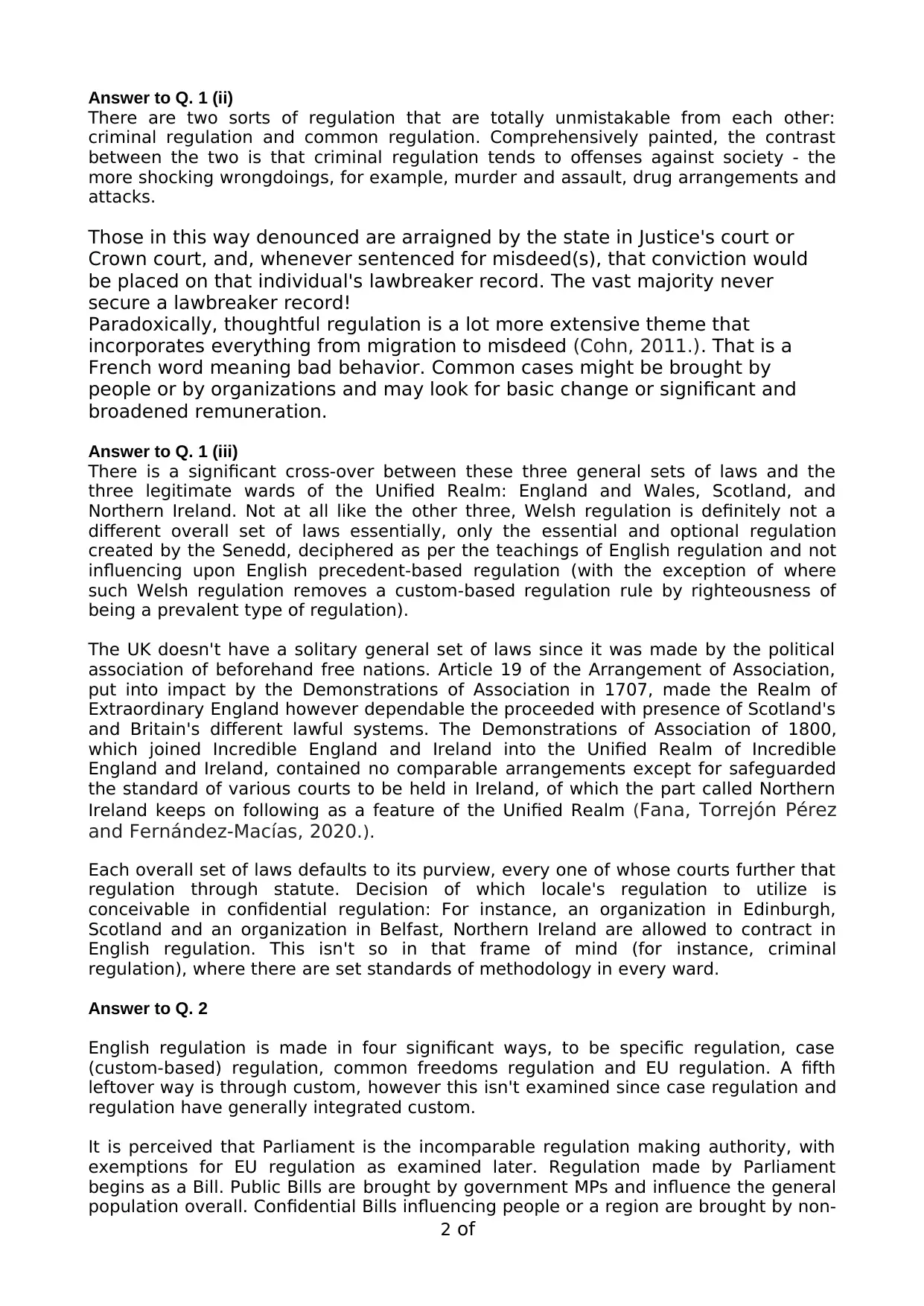
2 of
5
Answer to Q. 1 (ii)
There are two sorts of regulation that are totally unmistakable from each other:
criminal regulation and common regulation. Comprehensively painted, the contrast
between the two is that criminal regulation tends to offenses against society - the
more shocking wrongdoings, for example, murder and assault, drug arrangements and
attacks.
Those in this way denounced are arraigned by the state in Justice's court or
Crown court, and, whenever sentenced for misdeed(s), that conviction would
be placed on that individual's lawbreaker record. The vast majority never
secure a lawbreaker record!
Paradoxically, thoughtful regulation is a lot more extensive theme that
incorporates everything from migration to misdeed (Cohn, 2011.). That is a
French word meaning bad behavior. Common cases might be brought by
people or by organizations and may look for basic change or significant and
broadened remuneration.
Answer to Q. 1 (iii)
There is a significant cross-over between these three general sets of laws and the
three legitimate wards of the Unified Realm: England and Wales, Scotland, and
Northern Ireland. Not at all like the other three, Welsh regulation is definitely not a
different overall set of laws essentially, only the essential and optional regulation
created by the Senedd, deciphered as per the teachings of English regulation and not
influencing upon English precedent-based regulation (with the exception of where
such Welsh regulation removes a custom-based regulation rule by righteousness of
being a prevalent type of regulation).
The UK doesn't have a solitary general set of laws since it was made by the political
association of beforehand free nations. Article 19 of the Arrangement of Association,
put into impact by the Demonstrations of Association in 1707, made the Realm of
Extraordinary England however dependable the proceeded with presence of Scotland's
and Britain's different lawful systems. The Demonstrations of Association of 1800,
which joined Incredible England and Ireland into the Unified Realm of Incredible
England and Ireland, contained no comparable arrangements except for safeguarded
the standard of various courts to be held in Ireland, of which the part called Northern
Ireland keeps on following as a feature of the Unified Realm (Fana, Torrejón Pérez
and Fernández-Macías, 2020.).
Each overall set of laws defaults to its purview, every one of whose courts further that
regulation through statute. Decision of which locale's regulation to utilize is
conceivable in confidential regulation: For instance, an organization in Edinburgh,
Scotland and an organization in Belfast, Northern Ireland are allowed to contract in
English regulation. This isn't so in that frame of mind (for instance, criminal
regulation), where there are set standards of methodology in every ward.
Answer to Q. 2
English regulation is made in four significant ways, to be specific regulation, case
(custom-based) regulation, common freedoms regulation and EU regulation. A fifth
leftover way is through custom, however this isn't examined since case regulation and
regulation have generally integrated custom.
It is perceived that Parliament is the incomparable regulation making authority, with
exemptions for EU regulation as examined later. Regulation made by Parliament
begins as a Bill. Public Bills are brought by government MPs and influence the general
population overall. Confidential Bills influencing people or a region are brought by non-
5
Answer to Q. 1 (ii)
There are two sorts of regulation that are totally unmistakable from each other:
criminal regulation and common regulation. Comprehensively painted, the contrast
between the two is that criminal regulation tends to offenses against society - the
more shocking wrongdoings, for example, murder and assault, drug arrangements and
attacks.
Those in this way denounced are arraigned by the state in Justice's court or
Crown court, and, whenever sentenced for misdeed(s), that conviction would
be placed on that individual's lawbreaker record. The vast majority never
secure a lawbreaker record!
Paradoxically, thoughtful regulation is a lot more extensive theme that
incorporates everything from migration to misdeed (Cohn, 2011.). That is a
French word meaning bad behavior. Common cases might be brought by
people or by organizations and may look for basic change or significant and
broadened remuneration.
Answer to Q. 1 (iii)
There is a significant cross-over between these three general sets of laws and the
three legitimate wards of the Unified Realm: England and Wales, Scotland, and
Northern Ireland. Not at all like the other three, Welsh regulation is definitely not a
different overall set of laws essentially, only the essential and optional regulation
created by the Senedd, deciphered as per the teachings of English regulation and not
influencing upon English precedent-based regulation (with the exception of where
such Welsh regulation removes a custom-based regulation rule by righteousness of
being a prevalent type of regulation).
The UK doesn't have a solitary general set of laws since it was made by the political
association of beforehand free nations. Article 19 of the Arrangement of Association,
put into impact by the Demonstrations of Association in 1707, made the Realm of
Extraordinary England however dependable the proceeded with presence of Scotland's
and Britain's different lawful systems. The Demonstrations of Association of 1800,
which joined Incredible England and Ireland into the Unified Realm of Incredible
England and Ireland, contained no comparable arrangements except for safeguarded
the standard of various courts to be held in Ireland, of which the part called Northern
Ireland keeps on following as a feature of the Unified Realm (Fana, Torrejón Pérez
and Fernández-Macías, 2020.).
Each overall set of laws defaults to its purview, every one of whose courts further that
regulation through statute. Decision of which locale's regulation to utilize is
conceivable in confidential regulation: For instance, an organization in Edinburgh,
Scotland and an organization in Belfast, Northern Ireland are allowed to contract in
English regulation. This isn't so in that frame of mind (for instance, criminal
regulation), where there are set standards of methodology in every ward.
Answer to Q. 2
English regulation is made in four significant ways, to be specific regulation, case
(custom-based) regulation, common freedoms regulation and EU regulation. A fifth
leftover way is through custom, however this isn't examined since case regulation and
regulation have generally integrated custom.
It is perceived that Parliament is the incomparable regulation making authority, with
exemptions for EU regulation as examined later. Regulation made by Parliament
begins as a Bill. Public Bills are brought by government MPs and influence the general
population overall. Confidential Bills influencing people or a region are brought by non-
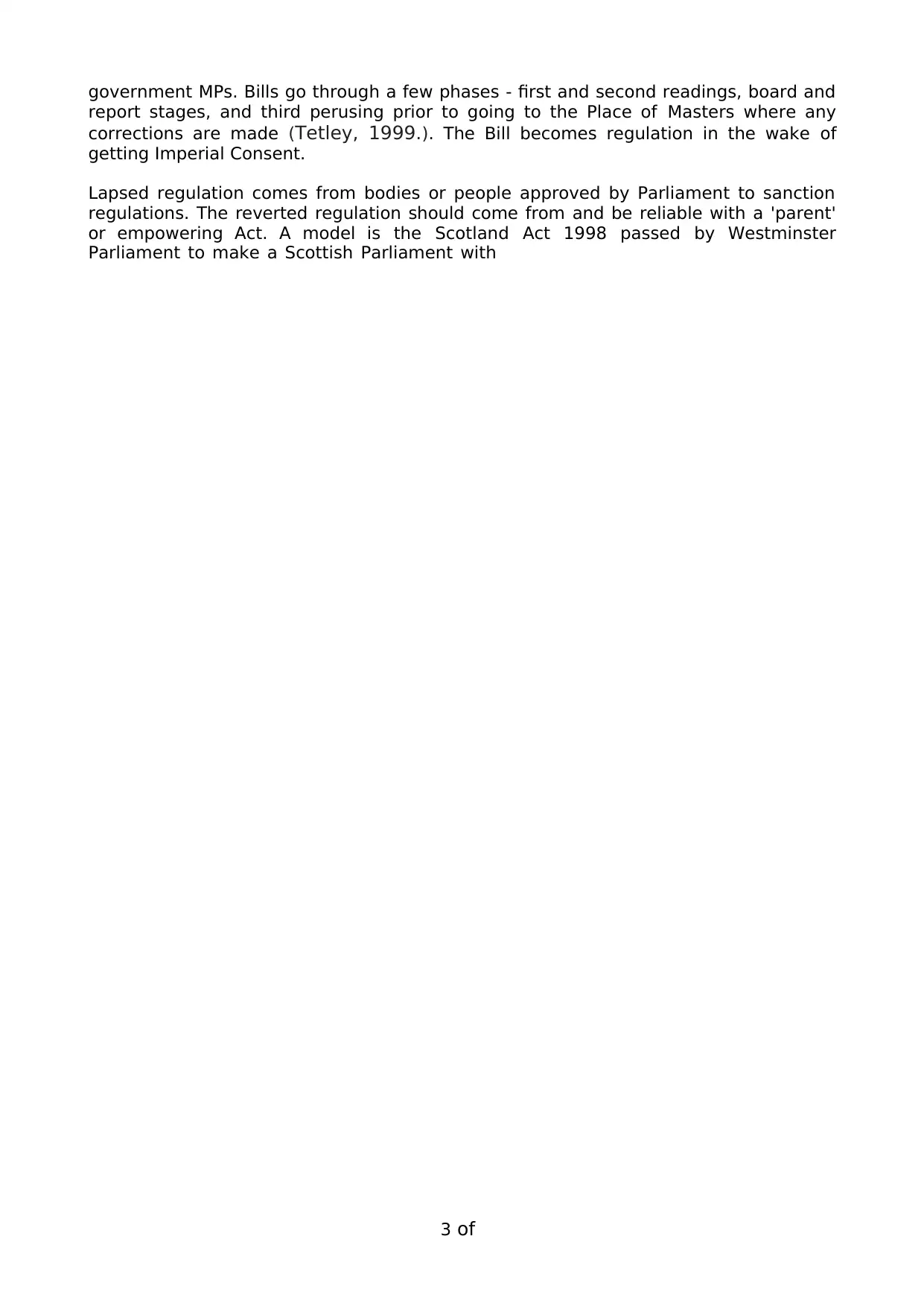
3 of
5
government MPs. Bills go through a few phases - first and second readings, board and
report stages, and third perusing prior to going to the Place of Masters where any
corrections are made (Tetley, 1999.). The Bill becomes regulation in the wake of
getting Imperial Consent.
Lapsed regulation comes from bodies or people approved by Parliament to sanction
regulations. The reverted regulation should come from and be reliable with a 'parent'
or empowering Act. A model is the Scotland Act 1998 passed by Westminster
Parliament to make a Scottish Parliament with
5
government MPs. Bills go through a few phases - first and second readings, board and
report stages, and third perusing prior to going to the Place of Masters where any
corrections are made (Tetley, 1999.). The Bill becomes regulation in the wake of
getting Imperial Consent.
Lapsed regulation comes from bodies or people approved by Parliament to sanction
regulations. The reverted regulation should come from and be reliable with a 'parent'
or empowering Act. A model is the Scotland Act 1998 passed by Westminster
Parliament to make a Scottish Parliament with
⊘ This is a preview!⊘
Do you want full access?
Subscribe today to unlock all pages.

Trusted by 1+ million students worldwide
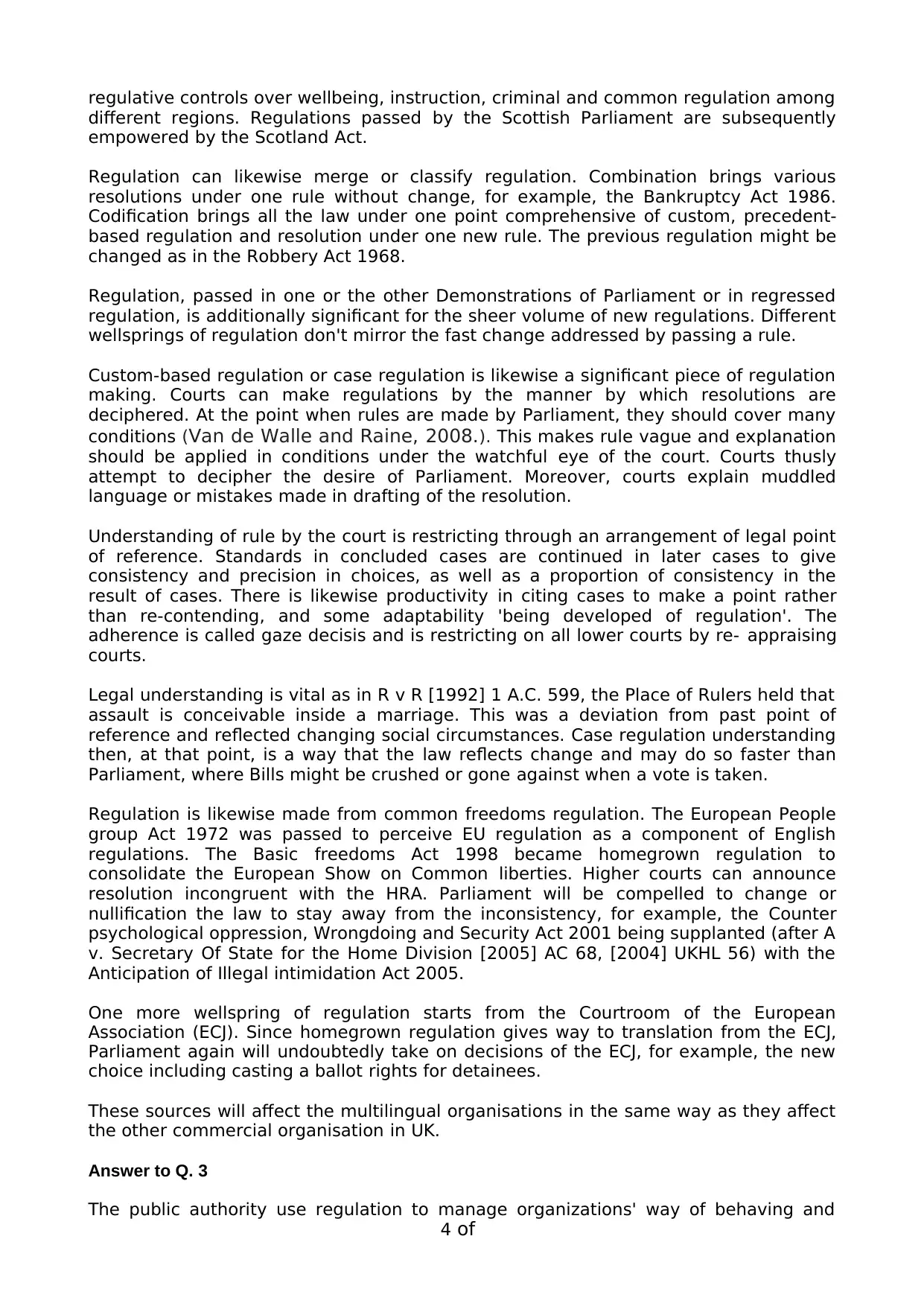
4 of
5
regulative controls over wellbeing, instruction, criminal and common regulation among
different regions. Regulations passed by the Scottish Parliament are subsequently
empowered by the Scotland Act.
Regulation can likewise merge or classify regulation. Combination brings various
resolutions under one rule without change, for example, the Bankruptcy Act 1986.
Codification brings all the law under one point comprehensive of custom, precedent-
based regulation and resolution under one new rule. The previous regulation might be
changed as in the Robbery Act 1968.
Regulation, passed in one or the other Demonstrations of Parliament or in regressed
regulation, is additionally significant for the sheer volume of new regulations. Different
wellsprings of regulation don't mirror the fast change addressed by passing a rule.
Custom-based regulation or case regulation is likewise a significant piece of regulation
making. Courts can make regulations by the manner by which resolutions are
deciphered. At the point when rules are made by Parliament, they should cover many
conditions (Van de Walle and Raine, 2008.). This makes rule vague and explanation
should be applied in conditions under the watchful eye of the court. Courts thusly
attempt to decipher the desire of Parliament. Moreover, courts explain muddled
language or mistakes made in drafting of the resolution.
Understanding of rule by the court is restricting through an arrangement of legal point
of reference. Standards in concluded cases are continued in later cases to give
consistency and precision in choices, as well as a proportion of consistency in the
result of cases. There is likewise productivity in citing cases to make a point rather
than re-contending, and some adaptability 'being developed of regulation'. The
adherence is called gaze decisis and is restricting on all lower courts by re- appraising
courts.
Legal understanding is vital as in R v R [1992] 1 A.C. 599, the Place of Rulers held that
assault is conceivable inside a marriage. This was a deviation from past point of
reference and reflected changing social circumstances. Case regulation understanding
then, at that point, is a way that the law reflects change and may do so faster than
Parliament, where Bills might be crushed or gone against when a vote is taken.
Regulation is likewise made from common freedoms regulation. The European People
group Act 1972 was passed to perceive EU regulation as a component of English
regulations. The Basic freedoms Act 1998 became homegrown regulation to
consolidate the European Show on Common liberties. Higher courts can announce
resolution incongruent with the HRA. Parliament will be compelled to change or
nullification the law to stay away from the inconsistency, for example, the Counter
psychological oppression, Wrongdoing and Security Act 2001 being supplanted (after A
v. Secretary Of State for the Home Division [2005] AC 68, [2004] UKHL 56) with the
Anticipation of Illegal intimidation Act 2005.
One more wellspring of regulation starts from the Courtroom of the European
Association (ECJ). Since homegrown regulation gives way to translation from the ECJ,
Parliament again will undoubtedly take on decisions of the ECJ, for example, the new
choice including casting a ballot rights for detainees.
These sources will affect the multilingual organisations in the same way as they affect
the other commercial organisation in UK.
Answer to Q. 3
The public authority use regulation to manage organizations' way of behaving and
5
regulative controls over wellbeing, instruction, criminal and common regulation among
different regions. Regulations passed by the Scottish Parliament are subsequently
empowered by the Scotland Act.
Regulation can likewise merge or classify regulation. Combination brings various
resolutions under one rule without change, for example, the Bankruptcy Act 1986.
Codification brings all the law under one point comprehensive of custom, precedent-
based regulation and resolution under one new rule. The previous regulation might be
changed as in the Robbery Act 1968.
Regulation, passed in one or the other Demonstrations of Parliament or in regressed
regulation, is additionally significant for the sheer volume of new regulations. Different
wellsprings of regulation don't mirror the fast change addressed by passing a rule.
Custom-based regulation or case regulation is likewise a significant piece of regulation
making. Courts can make regulations by the manner by which resolutions are
deciphered. At the point when rules are made by Parliament, they should cover many
conditions (Van de Walle and Raine, 2008.). This makes rule vague and explanation
should be applied in conditions under the watchful eye of the court. Courts thusly
attempt to decipher the desire of Parliament. Moreover, courts explain muddled
language or mistakes made in drafting of the resolution.
Understanding of rule by the court is restricting through an arrangement of legal point
of reference. Standards in concluded cases are continued in later cases to give
consistency and precision in choices, as well as a proportion of consistency in the
result of cases. There is likewise productivity in citing cases to make a point rather
than re-contending, and some adaptability 'being developed of regulation'. The
adherence is called gaze decisis and is restricting on all lower courts by re- appraising
courts.
Legal understanding is vital as in R v R [1992] 1 A.C. 599, the Place of Rulers held that
assault is conceivable inside a marriage. This was a deviation from past point of
reference and reflected changing social circumstances. Case regulation understanding
then, at that point, is a way that the law reflects change and may do so faster than
Parliament, where Bills might be crushed or gone against when a vote is taken.
Regulation is likewise made from common freedoms regulation. The European People
group Act 1972 was passed to perceive EU regulation as a component of English
regulations. The Basic freedoms Act 1998 became homegrown regulation to
consolidate the European Show on Common liberties. Higher courts can announce
resolution incongruent with the HRA. Parliament will be compelled to change or
nullification the law to stay away from the inconsistency, for example, the Counter
psychological oppression, Wrongdoing and Security Act 2001 being supplanted (after A
v. Secretary Of State for the Home Division [2005] AC 68, [2004] UKHL 56) with the
Anticipation of Illegal intimidation Act 2005.
One more wellspring of regulation starts from the Courtroom of the European
Association (ECJ). Since homegrown regulation gives way to translation from the ECJ,
Parliament again will undoubtedly take on decisions of the ECJ, for example, the new
choice including casting a ballot rights for detainees.
These sources will affect the multilingual organisations in the same way as they affect
the other commercial organisation in UK.
Answer to Q. 3
The public authority use regulation to manage organizations' way of behaving and
Paraphrase This Document
Need a fresh take? Get an instant paraphrase of this document with our AI Paraphraser
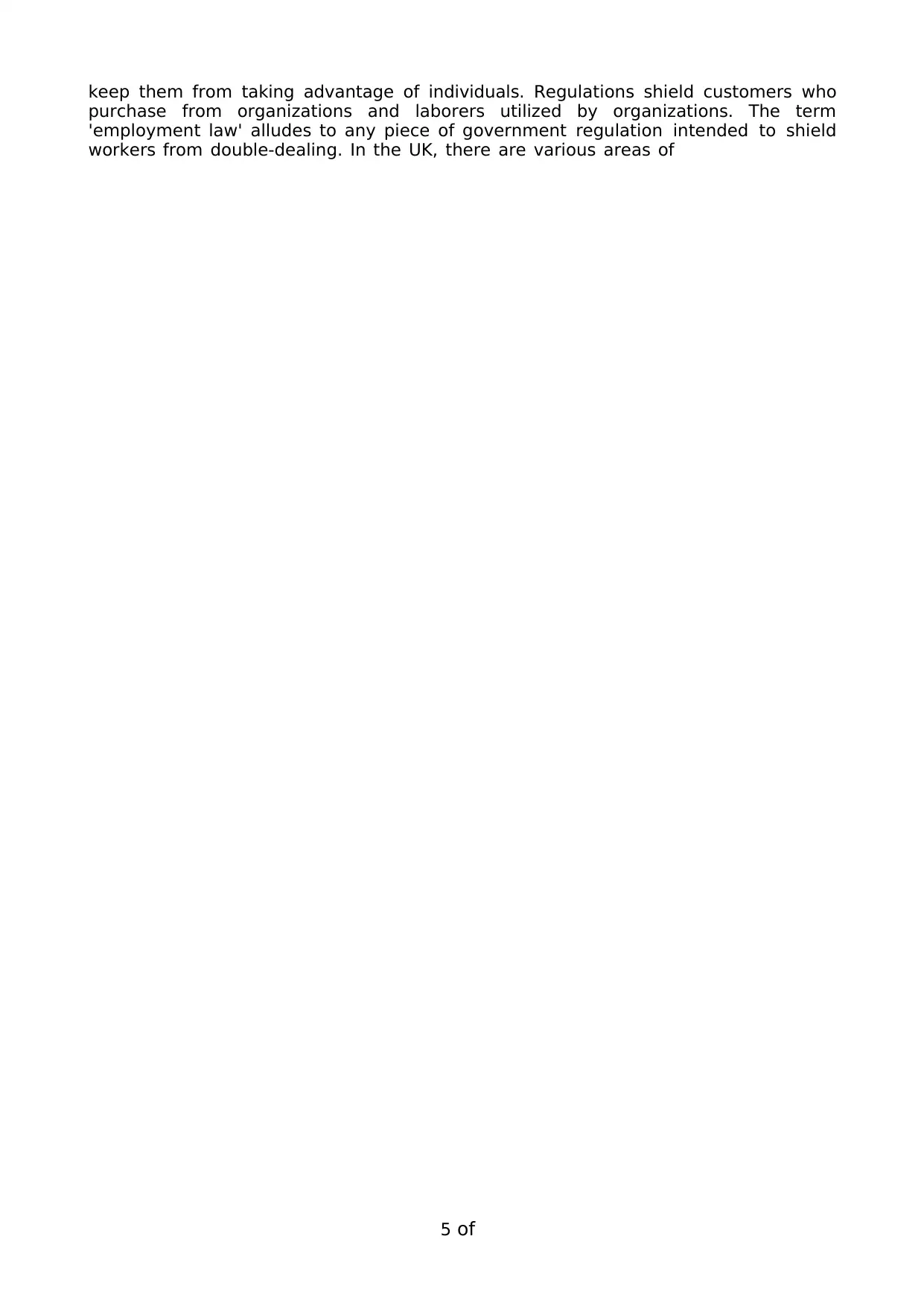
5 of
5
keep them from taking advantage of individuals. Regulations shield customers who
purchase from organizations and laborers utilized by organizations. The term
'employment law' alludes to any piece of government regulation intended to shield
workers from double-dealing. In the UK, there are various areas of
5
keep them from taking advantage of individuals. Regulations shield customers who
purchase from organizations and laborers utilized by organizations. The term
'employment law' alludes to any piece of government regulation intended to shield
workers from double-dealing. In the UK, there are various areas of
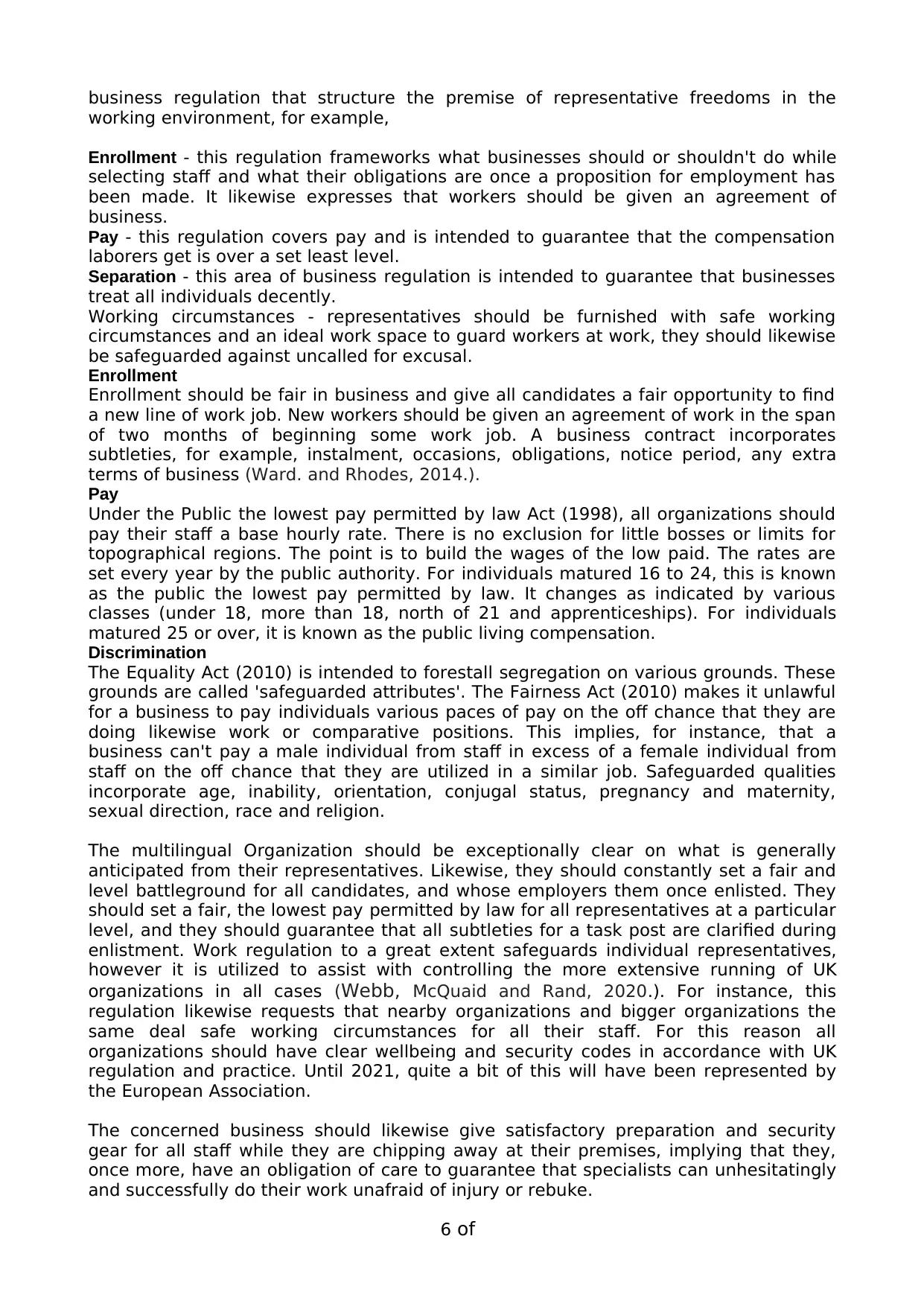
6 of
5
business regulation that structure the premise of representative freedoms in the
working environment, for example,
Enrollment - this regulation frameworks what businesses should or shouldn't do while
selecting staff and what their obligations are once a proposition for employment has
been made. It likewise expresses that workers should be given an agreement of
business.
Pay - this regulation covers pay and is intended to guarantee that the compensation
laborers get is over a set least level.
Separation - this area of business regulation is intended to guarantee that businesses
treat all individuals decently.
Working circumstances - representatives should be furnished with safe working
circumstances and an ideal work space to guard workers at work, they should likewise
be safeguarded against uncalled for excusal.
Enrollment
Enrollment should be fair in business and give all candidates a fair opportunity to find
a new line of work job. New workers should be given an agreement of work in the span
of two months of beginning some work job. A business contract incorporates
subtleties, for example, instalment, occasions, obligations, notice period, any extra
terms of business (Ward. and Rhodes, 2014.).
Pay
Under the Public the lowest pay permitted by law Act (1998), all organizations should
pay their staff a base hourly rate. There is no exclusion for little bosses or limits for
topographical regions. The point is to build the wages of the low paid. The rates are
set every year by the public authority. For individuals matured 16 to 24, this is known
as the public the lowest pay permitted by law. It changes as indicated by various
classes (under 18, more than 18, north of 21 and apprenticeships). For individuals
matured 25 or over, it is known as the public living compensation.
Discrimination
The Equality Act (2010) is intended to forestall segregation on various grounds. These
grounds are called 'safeguarded attributes'. The Fairness Act (2010) makes it unlawful
for a business to pay individuals various paces of pay on the off chance that they are
doing likewise work or comparative positions. This implies, for instance, that a
business can't pay a male individual from staff in excess of a female individual from
staff on the off chance that they are utilized in a similar job. Safeguarded qualities
incorporate age, inability, orientation, conjugal status, pregnancy and maternity,
sexual direction, race and religion.
The multilingual Organization should be exceptionally clear on what is generally
anticipated from their representatives. Likewise, they should constantly set a fair and
level battleground for all candidates, and whose employers them once enlisted. They
should set a fair, the lowest pay permitted by law for all representatives at a particular
level, and they should guarantee that all subtleties for a task post are clarified during
enlistment. Work regulation to a great extent safeguards individual representatives,
however it is utilized to assist with controlling the more extensive running of UK
organizations in all cases (Webb, McQuaid and Rand, 2020.). For instance, this
regulation likewise requests that nearby organizations and bigger organizations the
same deal safe working circumstances for all their staff. For this reason all
organizations should have clear wellbeing and security codes in accordance with UK
regulation and practice. Until 2021, quite a bit of this will have been represented by
the European Association.
The concerned business should likewise give satisfactory preparation and security
gear for all staff while they are chipping away at their premises, implying that they,
once more, have an obligation of care to guarantee that specialists can unhesitatingly
and successfully do their work unafraid of injury or rebuke.
5
business regulation that structure the premise of representative freedoms in the
working environment, for example,
Enrollment - this regulation frameworks what businesses should or shouldn't do while
selecting staff and what their obligations are once a proposition for employment has
been made. It likewise expresses that workers should be given an agreement of
business.
Pay - this regulation covers pay and is intended to guarantee that the compensation
laborers get is over a set least level.
Separation - this area of business regulation is intended to guarantee that businesses
treat all individuals decently.
Working circumstances - representatives should be furnished with safe working
circumstances and an ideal work space to guard workers at work, they should likewise
be safeguarded against uncalled for excusal.
Enrollment
Enrollment should be fair in business and give all candidates a fair opportunity to find
a new line of work job. New workers should be given an agreement of work in the span
of two months of beginning some work job. A business contract incorporates
subtleties, for example, instalment, occasions, obligations, notice period, any extra
terms of business (Ward. and Rhodes, 2014.).
Pay
Under the Public the lowest pay permitted by law Act (1998), all organizations should
pay their staff a base hourly rate. There is no exclusion for little bosses or limits for
topographical regions. The point is to build the wages of the low paid. The rates are
set every year by the public authority. For individuals matured 16 to 24, this is known
as the public the lowest pay permitted by law. It changes as indicated by various
classes (under 18, more than 18, north of 21 and apprenticeships). For individuals
matured 25 or over, it is known as the public living compensation.
Discrimination
The Equality Act (2010) is intended to forestall segregation on various grounds. These
grounds are called 'safeguarded attributes'. The Fairness Act (2010) makes it unlawful
for a business to pay individuals various paces of pay on the off chance that they are
doing likewise work or comparative positions. This implies, for instance, that a
business can't pay a male individual from staff in excess of a female individual from
staff on the off chance that they are utilized in a similar job. Safeguarded qualities
incorporate age, inability, orientation, conjugal status, pregnancy and maternity,
sexual direction, race and religion.
The multilingual Organization should be exceptionally clear on what is generally
anticipated from their representatives. Likewise, they should constantly set a fair and
level battleground for all candidates, and whose employers them once enlisted. They
should set a fair, the lowest pay permitted by law for all representatives at a particular
level, and they should guarantee that all subtleties for a task post are clarified during
enlistment. Work regulation to a great extent safeguards individual representatives,
however it is utilized to assist with controlling the more extensive running of UK
organizations in all cases (Webb, McQuaid and Rand, 2020.). For instance, this
regulation likewise requests that nearby organizations and bigger organizations the
same deal safe working circumstances for all their staff. For this reason all
organizations should have clear wellbeing and security codes in accordance with UK
regulation and practice. Until 2021, quite a bit of this will have been represented by
the European Association.
The concerned business should likewise give satisfactory preparation and security
gear for all staff while they are chipping away at their premises, implying that they,
once more, have an obligation of care to guarantee that specialists can unhesitatingly
and successfully do their work unafraid of injury or rebuke.
⊘ This is a preview!⊘
Do you want full access?
Subscribe today to unlock all pages.

Trusted by 1+ million students worldwide
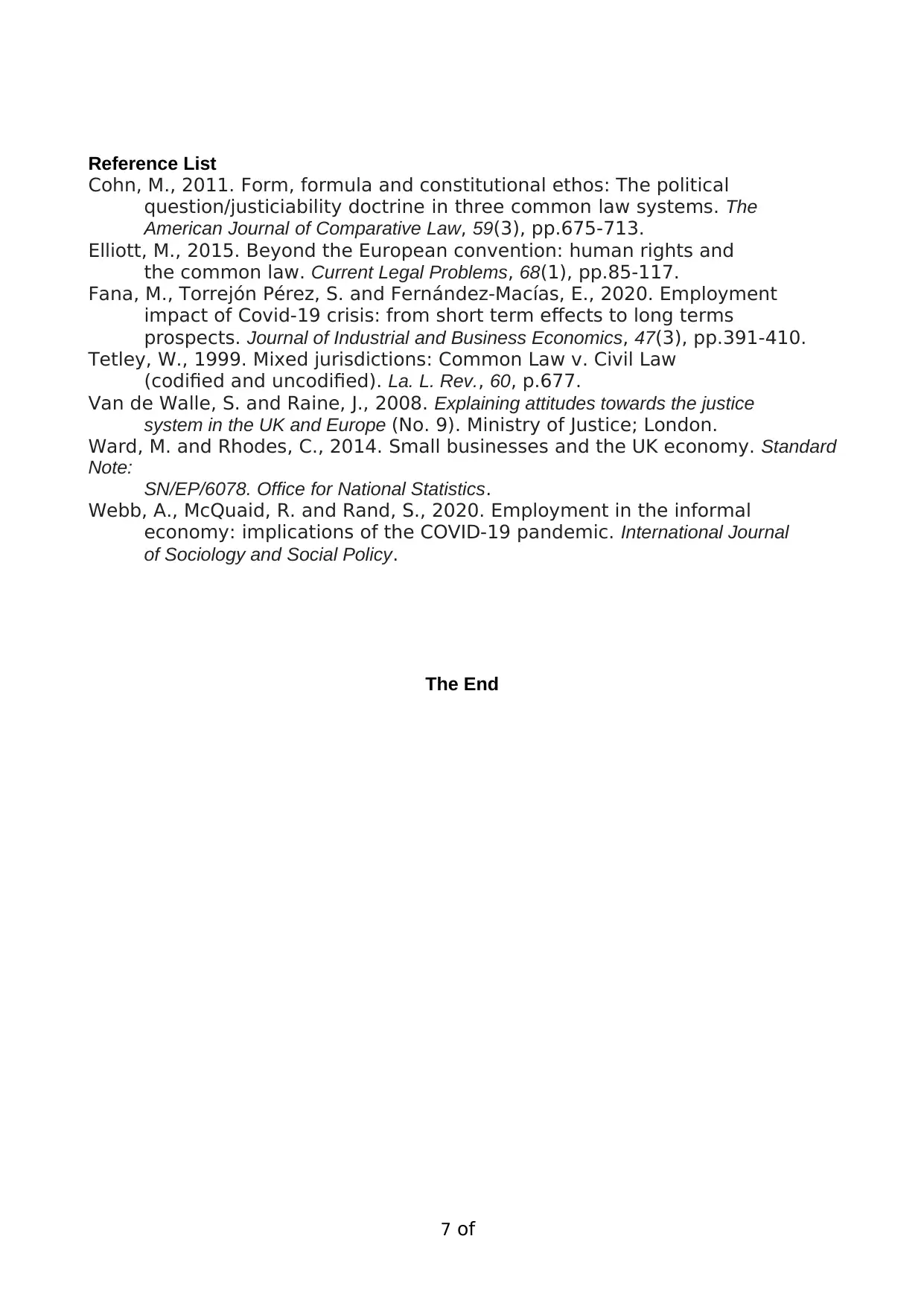
7 of
5
Reference List
Cohn, M., 2011. Form, formula and constitutional ethos: The political
question/justiciability doctrine in three common law systems. The
American Journal of Comparative Law, 59(3), pp.675-713.
Elliott, M., 2015. Beyond the European convention: human rights and
the common law. Current Legal Problems, 68(1), pp.85-117.
Fana, M., Torrejón Pérez, S. and Fernández-Macías, E., 2020. Employment
impact of Covid-19 crisis: from short term effects to long terms
prospects. Journal of Industrial and Business Economics, 47(3), pp.391-410.
Tetley, W., 1999. Mixed jurisdictions: Common Law v. Civil Law
(codified and uncodified). La. L. Rev., 60, p.677.
Van de Walle, S. and Raine, J., 2008. Explaining attitudes towards the justice
system in the UK and Europe (No. 9). Ministry of Justice; London.
Ward, M. and Rhodes, C., 2014. Small businesses and the UK economy. Standard
Note:
SN/EP/6078. Office for National Statistics.
Webb, A., McQuaid, R. and Rand, S., 2020. Employment in the informal
economy: implications of the COVID-19 pandemic. International Journal
of Sociology and Social Policy.
The End
5
Reference List
Cohn, M., 2011. Form, formula and constitutional ethos: The political
question/justiciability doctrine in three common law systems. The
American Journal of Comparative Law, 59(3), pp.675-713.
Elliott, M., 2015. Beyond the European convention: human rights and
the common law. Current Legal Problems, 68(1), pp.85-117.
Fana, M., Torrejón Pérez, S. and Fernández-Macías, E., 2020. Employment
impact of Covid-19 crisis: from short term effects to long terms
prospects. Journal of Industrial and Business Economics, 47(3), pp.391-410.
Tetley, W., 1999. Mixed jurisdictions: Common Law v. Civil Law
(codified and uncodified). La. L. Rev., 60, p.677.
Van de Walle, S. and Raine, J., 2008. Explaining attitudes towards the justice
system in the UK and Europe (No. 9). Ministry of Justice; London.
Ward, M. and Rhodes, C., 2014. Small businesses and the UK economy. Standard
Note:
SN/EP/6078. Office for National Statistics.
Webb, A., McQuaid, R. and Rand, S., 2020. Employment in the informal
economy: implications of the COVID-19 pandemic. International Journal
of Sociology and Social Policy.
The End
1 out of 7
Related Documents
Your All-in-One AI-Powered Toolkit for Academic Success.
+13062052269
info@desklib.com
Available 24*7 on WhatsApp / Email
![[object Object]](/_next/static/media/star-bottom.7253800d.svg)
Unlock your academic potential
Copyright © 2020–2026 A2Z Services. All Rights Reserved. Developed and managed by ZUCOL.


